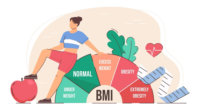Grief is an inevitable part of life, often experienced after the loss of a loved one, a significant life change, or other emotionally impactful events. While grief is a natural emotional response, it can also have profound effects on your physical and mental health. Understanding how grief can affect your well-being is essential in navigating the healing process and taking steps to support your body and mind during difficult times.
The Physical Effects of Grief
Grief is not just an emotional experience; it can manifest physically in many ways. The stress and sadness associated with grief can take a toll on the body, leading to various health issues.
1. Immune System Suppression
One of the most significant ways grief can affect your health is by weakening your immune system. When you’re grieving, the body produces higher levels of cortisol, a stress hormone that can suppress the immune response. This can make you more susceptible to infections, illnesses, and prolonged recovery from ailments.
2. Fatigue and Exhaustion
Grief often leads to extreme physical fatigue. The emotional toll of loss can drain your energy, making it difficult to perform daily tasks. It’s common to feel constantly tired, even if you are sleeping more than usual. This type of exhaustion can last for weeks or months, depending on how long the grieving process continues.
3. Sleep Disturbances
Many people experience insomnia or difficulty sleeping when they are grieving. The emotional turmoil and racing thoughts can make it hard to fall asleep or stay asleep, leading to sleep deprivation. This, in turn, can worsen feelings of sadness, irritability, and anxiety, creating a cycle that further impairs mental and physical health.
4. Changes in Appetite
Grief can affect your appetite in different ways. Some people may lose their appetite and struggle to eat, leading to weight loss and nutrient deficiencies. Others may turn to comfort food as a coping mechanism, which can lead to overeating and weight gain. Both extremes can negatively impact your overall health.
5. Increased Risk of Heart Problems
Research has shown that intense grief can increase the risk of heart problems, such as broken heart syndrome(also known as stress-induced cardiomyopathy). This condition mimics a heart attack and is triggered by extreme emotional distress. Grief-related stress can also exacerbate existing heart conditions, raising the risk of heart attacks and strokes.

The Mental and Emotional Impact of Grief
Grief is predominantly associated with emotional and mental struggles, which can have long-term consequences if not properly addressed.
1. Depression
One of the most common mental health impacts of grief is depression. Feelings of overwhelming sadness, hopelessness, and despair can persist for an extended period, making it difficult to function in daily life. While it is natural to feel sad after a loss, prolonged depression may require professional intervention.
2. Anxiety
Grief can trigger anxiety, especially when the loss involves uncertainty about the future. People who are grieving may experience panic attacks, constant worry, or fear about their mortality or the safety of loved ones. This heightened anxiety can interfere with sleep, work, and social interactions.
3. Cognitive Impairment
The intense emotions experienced during grief can affect cognitive function. It’s common to feel foggy, distracted, or unable to concentrate. Grief can impair memory, decision-making, and problem-solving abilities, making it harder to carry out everyday responsibilities.
4. Social Withdrawal
Many individuals who are grieving feel the urge to isolate themselves from others. This social withdrawal can deepen feelings of loneliness and exacerbate mental health problems like depression and anxiety. It’s important to stay connected with friends, family, or support groups to combat these feelings.
Coping with Grief to Protect Your Health
While grief is a personal and often long process, there are ways to manage its impact on your health.
1. Seek Professional Support
Talking to a therapist or counsellor can be incredibly helpful in processing grief. Professional support allows you to explore your feelings in a safe space and develop healthy coping strategies. Therapy can also prevent grief from turning into a more severe mental health issue like depression or post-traumatic stress disorder (PTSD).
2. Stay Physically Active
Exercise can help alleviate some of the physical symptoms of grief, such as fatigue and sleep disturbances. Physical activity triggers the release of endorphins, which are natural mood lifters. Even light exercise, such as walking or yoga, can make a difference.
3. Maintain a Balanced Diet
Eating a balanced diet can support your immune system and provide the energy you need to navigate grief. Avoid turning to sugary or fatty comfort foods, which can worsen feelings of lethargy and impact your mood. Focus on whole foods, including fruits, vegetables, lean proteins, and whole grains.
4. Join a Support Group
Grief can feel isolating, but you’re not alone. Joining a support group allows you to connect with others who are going through similar experiences. Sharing your story and listening to others can offer comfort and reduce feelings of loneliness.
5. Practice Mindfulness and Meditation
Mindfulness and meditation can help calm the mind and reduce the emotional intensity of grief. These practices encourage you to focus on the present moment, which can relieve anxiety and improve mental clarity.
Conclusion
Grief affects your health in various ways, from weakening your immune system to impacting your mental well-being. Understanding how grief can affect both your body and mind is the first step in managing its effects. By seeking professional help, maintaining a healthy lifestyle, and finding social support, you can protect your health and navigate the grieving process in a healthier, more constructive way.









